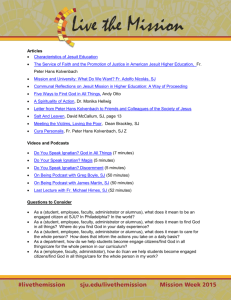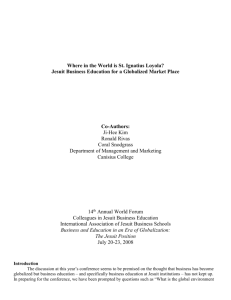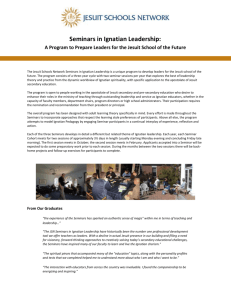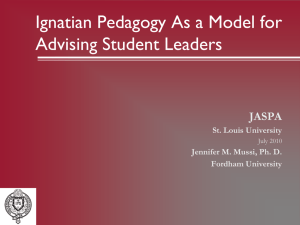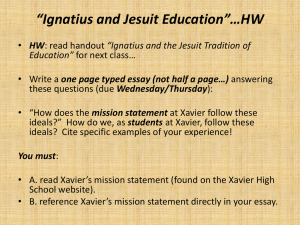Jesuit Education: Embracing the New Frontiers
advertisement
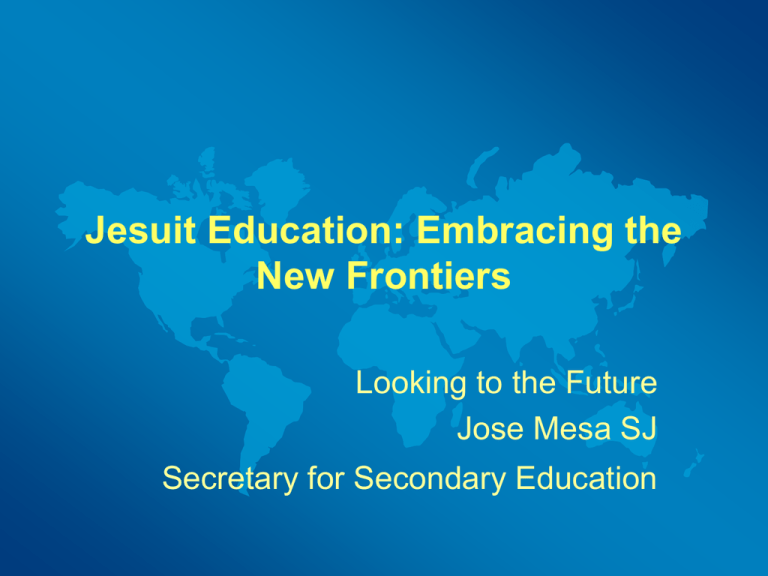
Jesuit Education: Embracing the New Frontiers Looking to the Future Jose Mesa SJ Secretary for Secondary Education Colloquium Goals 1. 2. To meet as a global network to respond together to the current challenges, especially the challenge to become a more effective apostolic network. To reflect together on the Jesuit Mission and Identity today to better respond to our apostolic frontiers. Context: IGNATIAN/JESUIT CG35 D6 9. The heart of an Ignatian work is the Spiritual Exercises of Ignatius. Indeed, any work may be said to be Ignatian when it manifests the Ignatian charism: i.e., when it intentionally seeks God in all things; when it practices Ignatian discernment; when it engages the world through a careful analysis of context, in dialogue with experience, evaluated through reflection, for the sake of action, and with openness, always, to evaluation. Such a work does not rely necessarily upon the Society of Jesus for its Ignatian identity, though it may affiliate with the Society in partnership through networks and other structures. IGNATIAN/JESUIT CG35 D6 10. An Ignatian work can be said to be Jesuit when it has a clear and definitive relationship with the Society of Jesus and when its mission accords with that of the Society by a commitment to a faith that does justice through interreligious dialogue and a creative engagement with culture. In such a context, the mission of the work, whether administered by a Jesuit or by another who shares this commitment, will be “ultimately accountable to the General of the Society through appropriate lines of authority”. REQUIESCAT IN PACE.. Isolated Schools… What is next? We have to use our imagination… We have to try, to change, to explore… We have to discern… We have to trust… We have to obey… Work for vocations… lay – Jesuit vocations Educating all in our mission… What next? The most important part of the colloquium: the follow up… What to do? How to do it? Final Statement Jesuit Education – Our Commitment to Global Networking From July 29 through August 2, 2012, for the first time in the history of the Society of Jesus, with the encouragement of Father General, and under the guidance of the International Commission on the Apostolate of Jesuit Education, the leaders of our secondary schools from around the world assembled in Boston, Massachusetts, U.S.A. Their goal was to strengthen our global network by providing a venue to share ideas and resources and to discuss their strengths and challenges in the light of our Jesuit mission and identity as expressed in the documents from the Thirty-fifth General Congregation of the Society of Jesus. At the conclusion of the meeting, the delegates are convinced that the new “signs of the times” warrant a change in our way of proceeding. This new way of proceeding includes on-going communication and collaboration through a continued development of our international network of schools. The goals of our collaboration will be to better serve the faith, justice, and care for the environment, to build bridges between youth and their faith communities, to develop stronger Jesuit/Ignatian Apostolic communities, and to provide our students with opportunities for a truly global education. Our international network of schools is uniquely suited to educate global citizens who will be able to participate in a globalization of solidarity, cooperation, and reconciliation that fully respects human life and dignity, and all of God’s creation. Our commitment to networking as a universal body, and our call to the frontiers, comes from our awareness of the world and our desire to effectively help students face global challenges. We are committed to: 1. Developing our truly unique global community and network. Our ability to respect and participate in our own situation, and yet be mindful of our universal identity and mission as Jesuit schools, is one of our greatest /resources and unparalleled in the world 2.Working with our established local and regional networks. While remaining committed to our regional priorities, we will at the same time focus on the importance of nurturing global relationships within the Jesuit network and other networks of secondary schools. 3. Using technology as a way to create, develop and foster our global relationships. We recognize that the physical distance that has historically formed significant obstacles to our communication still exists, but that it should no longer prohibit global communication and collaboration. We will provide opportunities for our students and staff to experience the world from a vantage point made possible by the vast reach of our network. 4. Developing twinning relationships, service outreach programs, virtual classroom experiences, and more, to provide students with experiences that truly prepare them to become leaders in the transformation of the world. 5. Providing a safe educational environment based on respect and dignity. This environment, conducive to learning, growing and developing, will be free of all forms of abuse. Derived from our commitments, we leave this meeting with the following suggested actions: 1. The momentum of the International Colloquium on Jesuit Secondary Education impels us to develop new and creative collaborative efforts amongst the global network of Jesuit secondary schools. These new efforts will fall under the leadership of the Secretariat of Secondary and Pre-Secondary Education and the International Commission on the Apostolate of Jesuit Education. 2. The Jesuit secondary schools represented at the ICJSE recognize the importance of assigning a member of its leadership team the responsibility of facilitating global collaboration and outreach to the global network. These representatives will work with already existing networks and structures to ensure that the efforts started at the ICJSE continue. 3. We recommend that the ICJSE newsletter and webpage continue as a forum for global communication, collaboration, and networking. This newsletter will ensure that our global network has a specific avenue to regularly communicate, share network initiatives, express desires for collaboration, and engage in conversation and share resources. 4. We recommend that this Colloquium experience should be continued in the future, and that plans should be made for the next colloquium to take place in 2016 or 2017 at a time and place to be determined. Follow UP Short-term Networking initiatives: Exchange programs: students, teachers… Common Collaboration projects (e.g. Ignacianos por Haiti) Twinning with other individual schools Knowledge management consultation for the physical network Survey technology available in the schools Network mapping Database about our schools. Assign a member of the school leadership team the responsibility for global networking Share what happened here with our school communities. Middle-term Networking initiatives: New document on the Jesuit/Ignatian identity of our schools Newsletter and web page II ICJSE Re-structuring of the Secretariat Long-term Networking initiatives: Develop strong local and regional networks (follow-up on management consultation and network mapping) Educate our school communities about GC 35’s vision of Jesuit/Ignatian culture: serving the global mission as a global community Training faculty as members of a global network Develop curriculum that educates our students to see themselves as part of a global network and develops them into global citizens. Long-term Networking initiatives: Develop a common “International Jesuit Baccalaureate program.” Promote advocacy programs for quality education for all. Develop networking with Jesuit school networks and Jesuitinspired networks working with the poor. Develop networking among existing pedagogical centers of the Society Develop networking with other Jesuit networks: higher education, social networks, etc. Develop networking with other non-Jesuit networks in the Catholic Church Develop networking with other non-Jesuit networks outside the Catholic Church And how about the Secretariat? Re-structuring the Secretariat Secretary: a full time secretary (Jose Mesa SJ) Secretary: We need a part time person for the Secretariat that can collaborate with all the secretarial work needed. The person can be in Rome but we need this person at least halftime for the Secretariat for Secondary Education. Assistant to the Secretariat Assistant to the Secretariat: this will be a part time, new position. The assistant should be able to take most of the administrative work dealing with the actions and projects described before: Gather information required to advance the projects. Coordinate, at the administrative level, people involved in the projects. Assist the secretary in the organization of the meetings required by the projects. Maintain the web page for the Secretariat in coordination with the Web-master and other officials at the Curia. Serve as a contact person for the Secretariat (Global Network). Assist the Secretary in order to achieve the goals established for the Secretariat.
